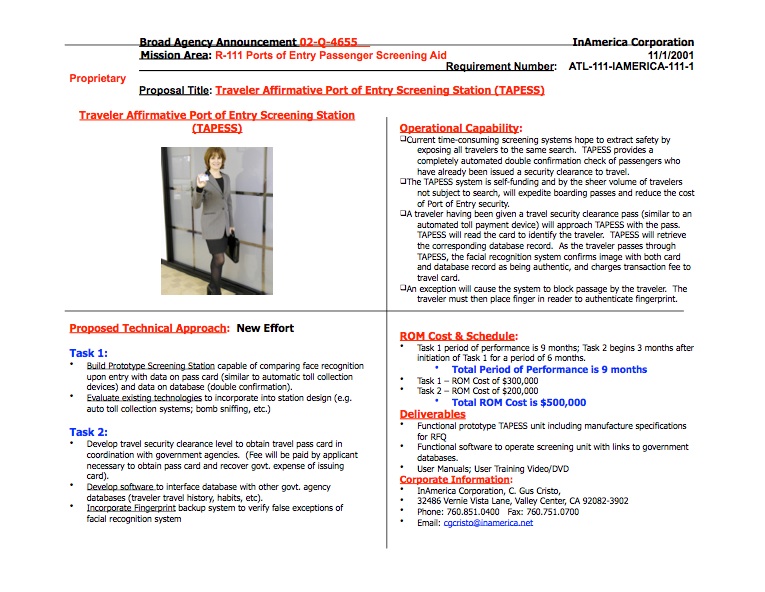Back to. . .

TravelPass>
Is there an alternative to sexual assault by the TSA, or a dose of radiation and sexually explicit photo saved in the bowels of a government database? Why yes! And it’s been around since the winter of 2001.
In the days following 911, our government in Washington DC was clearly shaken by the destruction of the day. The realization about our obvious vulnerability was so intense, that a little over a month later, the national news was carrying stories how the government was asking for ideas on how we could better protect ourselves.
Like many other patriotic individuals and companies, InAmerica obtained the Under Secretary of Defense’s Package to submit its own idea. The deadline for submission was only two months from the issuance of the package.
The package requested ideas in many areas within the entire framework of combatting terrorism. InAmerica chose to work on the objective identified as R-111 Ports of Entry Passenger Screening Aid. true to form, the government required its one-size-fits-all proposal, specifying the exact size of the page, the format of the submission, etc. We even named it with a government-style acronym. The specimen to the right was InAmerica’s compliance with the dictated format. Unfortunately, the format didn’t provide a clear idea of InAmerica’s solution.
Month’s later, a short email from the government indicated that it was not interested in InAmerica’s design. Several month’s after our rejection notice, we did see a short news story describing a system being considered that was strikingly similar to InAmerica’s idea. Considering the stakes involved, InAmerica was happy to see the idea adopted, even though it was locked out of the development. We were thinking as citizens. . . not a business.
Unfortunately, a decade later, not only is our system not implemented, but the new security screening protocol requires a choice between being burned with x-rays and a database of sexually explicit photos, and actual sexual assault by a TSA officer in the name of security. We may be in a different world than we were in just after 911, but we still believe our system would better serve the current purpose than the one already implemented by our government.
While we don’t believe the bureaucracy will be any more receptive to InNovation today than it was in 2001, we are heartened that the people have finally gotten involved with government. We suspect the people realize they must take action before the politicians destroy our country completely.
We offer this InAmerica InNovation for your consideration. If it makes sense to you, perhaps you might direct your congressman or senator to this site to consider the merits of our screening system.
The Basic Premise
As with any government-designed system, the one-size-fits-all mentality, is the reason why 80 year old grandmothers are scrutinized like everyone else. The only possible exception is when political correctness trumps safety and young muslims from Yemen are not scrutinized at all.




How TravelPass> Works
The strength of InAmerica’s Traveler Affirmative Port of Entry Screening Station (TAPESS) is the ability to avoid scrutinizing every single person looking to board an airplane. The government’s mentality was recently exposed for its inflexibility, when the aircraft pilot’s union revolted over the increased exposure to x-rays by pilots who pass through security more often and are exposed to more x-rays in prolonged high altitude flying. Finally, the simple question “Why do we screen the pilot when all he has to do is put the aircraft into a dive and crash the plane without any hidden box cutters or liquid explosive?”
TAPESS establishes a procedure that offers private citizens a background check in order to obtain a security clearance. The citizen must pay for the cost of obtaining the security clearance, but once obtained, the passenger is no longer required to be screened with other passengers.
Once a citizen qualifies for the Airline Passenger Security Clearance (APSC), he is issued a travel card that contains text and biometric identification information. The citizen also pays the expense of obtaining the card.
Expedited Airport Checkin
Now once a citizen has his travel card, he approached a separate security check point at the airport reserved for individuals with travel cards. The passenger inserts his travel card to gain entry into the screening station. A camera located in the roof of the screening station captures the face of the passenger, and using facial recognition technology, compares the face with the pre-cleared
face it just received from the travel card and double checks it with the database file for the same individual (preloaded at the station). If the facial recognition fails (perhaps he just had a root canal and his cheek was swollen), then the passenger is prompted to place his hand on a reader. The hand print is compared to the print just received from the travel card and double-checked against the handprint in the database. At this point the station recognizes the passenger as a cleared individual and opens the door to allow passage into the gate area. If the passenger fails both checks, he must go to secondary screening and be sexually assaulted like the rest of us.
Elegant Solution
The elegance of this solution is that the technology already exists; the cost is paid for by the traveling passenger; and since the passenger is now a registered person with a security clearance, any negative update to the file will alert the system, and require a secondary check.
The fact that most of the frequent fliers would likely acquire these travel cards, the security checkpoints would need to accommodate fewer passengers. There is no groping. There is no sexually-explicit photos, there is no invasion of privacy. The constitutionally granted rights are preserved.
If you’re one of the passengers that have been treated to the TSA’s grind-n-bump, you might want to alert your congressperson to take another look at something the government passed on.
Copyright © 2010-12 InAmerica, Inc. All rights reserved.













